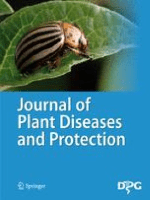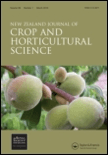
Australasian Plant Disease Notes
Scope & Guideline
Empowering Researchers with Vital Plant Disease Knowledge
Introduction
Aims and Scopes
- Documentation of New Plant Pathogens:
The journal emphasizes the importance of reporting new and emerging plant pathogens, including viruses, fungi, nematodes, and bacteria affecting various crops. This focus helps in tracking the spread of diseases and understanding their impact on agriculture. - Geographic and Host Range Extensions:
Research published in the journal often includes reports on the geographic range expansion of known pathogens and their association with new host plants. This aspect is crucial for predicting potential threats to crop health and biodiversity. - Disease Management Strategies:
The journal also highlights innovative approaches to disease management, including the use of resistant cultivars and integrated pest management practices. Such studies aim to provide practical solutions for farmers and agricultural stakeholders. - Molecular Characterization of Pathogens:
There is a strong emphasis on the molecular characterization of pathogens, which aids in understanding their biology, pathogenicity, and evolution. This research contributes to better diagnostic techniques and management practices. - International Collaboration and Reporting:
The Australasian Plant Disease Notes serves as a global platform, showcasing research from various countries and regions. This international perspective is vital for addressing plant disease issues that transcend geographical boundaries.
Trending and Emerging
- Emergence of Novel Pathogens:
There is a notable increase in reports of novel pathogens affecting a variety of crops, highlighting the need for ongoing surveillance and research to understand their impact on agriculture. - Global Spread of Existing Pathogens:
Recent publications show a trend towards documenting the global spread of existing pathogens, emphasizing their impact on new geographical areas and crops. This trend is critical for preemptive management strategies. - Integrated Disease Management Approaches:
The journal is increasingly publishing studies on integrated disease management strategies that combine biological, cultural, and chemical methods to control plant diseases more sustainably. - Molecular Diagnostics and Genomics:
There is a growing emphasis on molecular diagnostics and genomic studies of pathogens, facilitating rapid identification and characterization of diseases, which is essential for timely management. - Impact of Climate Change on Plant Diseases:
Emerging research is focusing on the effects of climate change on the incidence and severity of plant diseases, underscoring the need for adaptive management strategies in agriculture.
Declining or Waning
- Traditional Disease Reports:
There has been a noticeable decrease in traditional reports of established plant diseases that were once prevalent in earlier publications. This shift may indicate a saturation of knowledge or a move towards more novel and emerging threats. - Focus on Localized Diseases:
Research concentrating on localized or region-specific diseases appears to be declining. As globalization and climate change alter disease dynamics, there is a growing emphasis on broader, more impactful studies. - Conventional Laboratory Studies:
The prevalence of conventional laboratory-based studies has decreased, suggesting a shift towards field-based research and real-world applications that address practical challenges faced by farmers. - Insect-Vector Studies:
There has been a waning interest in studies specifically focusing on insect vectors of plant diseases. The current trend seems to favor integrated approaches that encompass multiple factors influencing disease spread. - Pathogen Resistance Mechanisms:
Research on the specific mechanisms of pathogen resistance in plants has become less frequent. This area, once a focal point, is now often integrated into broader studies on disease management and crop resilience.
Similar Journals

Journal of Plant Diseases and Protection
Fostering Global Collaboration in Plant ScienceThe Journal of Plant Diseases and Protection, published by SPRINGER HEIDELBERG in Germany, is a premier platform for the dissemination of cutting-edge research in the fields of Agronomy, Horticulture, and Plant Science. With its Q2 ranking in multiple categories as of 2023, this journal stands out in the academic landscape, highlighting its strong performance with a notable Scopus rank of 22nd in Horticulture and placing in the top percentile for Agronomy and Plant Science. The journal spans from 2006 to 2024, making it a valuable resource for researchers, professionals, and students seeking to stay abreast of advancements in the understanding of plant diseases and their protection. The Open Access options further enhance its accessibility, fostering a global exchange of knowledge essential for addressing contemporary agricultural challenges.

Zemdirbyste-Agriculture
Cultivating innovation in agronomy and crop science.Zemdirbyste-Agriculture is a prominent journal dedicated to advancing the field of agricultural sciences, with a particular focus on agronomy and crop science. Published by the Lithuanian Research Centre Agriculture & Forestry, this open access journal has been fostering knowledge sharing and scientific discourse since 2004, allowing researchers, professionals, and students unrestricted access to its content. Located in the beautiful country of Lithuania, specifically at Vytautas Magnus University, this journal plays a significant role in disseminating innovative research findings. With a 2023 Scopus ranking of #246 out of 406 in the category of Agricultural and Biological Sciences, Zemdirbyste-Agriculture falls within the Q3 quartile, reflecting its growing influence in the academic community. This journal, which has converged its publication focus from 2008 to 2023, aims to provide a platform for scientists to share their critical insights on agricultural practices, sustainability, and technological advancements in crop science, thereby contributing to the global discourse on food security and environmental health.

Annual Review of Phytopathology
Connecting academia with critical plant health issues.Annual Review of Phytopathology, published by ANNUAL REVIEWS, is an esteemed journal that has been at the forefront of the field since its inception in 1973. With a focus on both Plant Science and Medicine, the journal holds a prestigious Q1 ranking in both categories for 2023, reflecting its influence and significance in the academic community. The journal features comprehensive review articles that encapsulate significant advancements and emerging trends in phytopathology, providing valuable insights for researchers, professionals, and students alike. Its rigorous peer-review process ensures the highest quality of publication, making it essential for anyone seeking to stay informed on critical issues affecting plant health and related disciplines. With an impressive Scopus ranking of #10 out of 516 in Agricultural and Biological Sciences, Annual Review of Phytopathology remains a vital resource for the dissemination of cutting-edge knowledge, fostering innovation and collaboration within the field.

International Journal of Plant Production
Empowering global food security with cutting-edge plant science.International Journal of Plant Production, published by SPRINGER in Switzerland, serves as a leading platform for the dissemination of innovative research in the fields of Agronomy, Crop Science, and Plant Science. With an ISSN of 1735-6814 and an E-ISSN of 1735-8043, this journal has maintained its reputation by achieving a Q2 quartile ranking in both categories as of 2023, alongside notable Scopus rankings placing it in the top quartiles of its fields (Rank #105/516 and Rank #88/406, respectively). The journal's scope encompasses a wide array of topics vital to sustainable agriculture and plant production systems, making it a critical resource for researchers, professionals, and students striving for advancements in these disciplines. By fostering open scientific dialogue and supporting cutting-edge research, the International Journal of Plant Production is committed to contributing to the resolution of global food security challenges, enhancing agricultural practices, and promoting ecological sustainability.

Phytopathology Research
Innovating solutions for global agricultural challenges.Phytopathology Research, published by SPRINGERNATURE, serves as a vital resource in the rapidly evolving fields of biochemistry, genetics, molecular biology, and plant sciences. Since adopting an open access model in 2019, this journal has fostered an inclusive approach to disseminating cutting-edge research and breakthroughs in plant pathology and related disciplines. With an impressive impact factor in the second quartile for Biochemistry, Genetics and Molecular Biology (miscellaneous) and Plant Science, and a robust standing in the Scopus rankings, it attracts high-quality contributions from researchers around the globe. The journal not only supports the academic community's quest for advanced knowledge but also plays a crucial role in addressing global agricultural challenges through innovative research. Positioned in the United Kingdom and operating with a keen focus on enhancing plant health and resistance, Phytopathology Research continues to be an essential platform for both established and emerging scientists in this vital area of study.

ARCHIVES OF PHYTOPATHOLOGY AND PLANT PROTECTION
Empowering Innovation in Plant Health and ProtectionArchives of Phytopathology and Plant Protection, published by Taylor & Francis Ltd, stands as a pivotal platform in the field of agronomy and crop science since its inception in 1974. With an ISSN of 0323-5408 and E-ISSN of 1477-2906, this journal is dedicated to publishing high-quality, peer-reviewed research that addresses contemporary challenges in plant pathology and protection. As a Q3 ranked journal in its category with Scopus Rank #210/406, it serves a vital role in disseminating practical solutions and innovative discoveries to enhance agricultural productivity and sustainability. The journal fosters a rich exchange of ideas among researchers, professionals, and students, empowering them to contribute to the advancement of the agronomy and biological sciences. Despite being traditionally subscription-based, the journal's commitment to comprehensive and rigorous research makes it an essential resource for anyone invested in the future of plant health and agricultural innovation.

PESQUISA AGROPECUARIA BRASILEIRA
Fostering collaboration for impactful agricultural research.PESQUISA AGROPECUARIA BRASILEIRA, an esteemed journal published by EMPRESA BRASIL PESQ AGROPEC, serves as a vital platform for disseminating research in the realms of agronomy, animal science, horticulture, and soil science. With an ISSN of 0100-204X and an e-ISSN of 1678-3921, this Open Access journal has been at the forefront of agricultural research since its initiation in 1978, and has been fully accessible to researchers globally since 1999. Hailing from Brazil, it is dedicated to advancing knowledge in agricultural practices and sustainability, making it an essential resource for academics and professionals alike. The journal is ranked in the Q3 and Q4 quartiles across various categories, reflecting its impact within the scientific community, while its Scopus rankings illustrate its commitment to high-quality scholarship. With its rigorous peer-review process, PESQUISA AGROPECUARIA BRASILEIRA not only promotes scholarly engagement but also plays a crucial role in addressing agricultural challenges, thus appealing to a broad audience of researchers, professionals, and students seeking to contribute to this dynamic field.

BANGLADESH JOURNAL OF BOTANY
Fostering Interdisciplinary Insights in BotanyBANGLADESH JOURNAL OF BOTANY is a prominent publication in the field of plant sciences, dedicated to advancing research and knowledge within the botanical community. Published by the BANGLADESH BOTANICAL SOC, this journal serves as a vital platform for researchers and scholars seeking to disseminate their findings related to plant biology, ecology, and conservation practices, particularly within the unique context of Bangladesh's diverse flora. With an ISSN of 0253-5416 and an E-ISSN of 2079-9926, the journal encompasses a wide scope of topics, reflecting interdisciplinary approaches in botanical research. Since its inception, with convergence periods from 1996 to 2001 and from 2003 to 2024, it has garnered recognition, positioned in the Q4 category in the Plant Science field with a ranking of #459/516 in Scopus, indicating its contribution to the field despite its developing impact. Operating within Bangladesh, at the UNIV DACCA DEPT BOTANY, the journal provides a crucial insight into the ecological and agricultural implications of plant studies in the region, catering to the needs of academics, professionals, and students eager to engage with contemporary botanical research.

NEW ZEALAND JOURNAL OF CROP AND HORTICULTURAL SCIENCE
Advancing Agricultural Insights for a Sustainable FutureThe New Zealand Journal of Crop and Horticultural Science, published by Taylor & Francis Ltd, stands as a key resource in the fields of Agronomy and Horticulture, with a commendable impact factor reflecting its quality and influence in the scientific community. Since its inception in 1989, this journal has been committed to advancing our understanding of crop development and horticultural practices, catering not only to researchers and professionals but also to students eager to delve into the intricacies of plant sciences. With a Q3 ranking in both Agronomy and Crop Science and Horticulture as of 2023, the journal occupies a significant position within the agricultural and biological sciences domain, significantly contributing to the body of knowledge in these fields. The journal features original research, reviews, and technical notes that cover a wide range of topics, ensuring a comprehensive perspective on contemporary and emerging agricultural issues. For individuals interested in accessing cutting-edge research, the journal provides subscription-based access, further enhancing its scholarly contributions.

PHYTOPATHOLOGIA MEDITERRANEA
Cultivating knowledge for a sustainable future.PHYTOPATHOLOGIA MEDITERRANEA is a premier open access journal published by the Mediterranean Phytopathological Union, dedicated to advancing knowledge in the fields of Agronomy, Crop Science, Horticulture, and Plant Science. With its Q1 status in Agronomy and Crop Science and Horticulture and a strong ranking in Plant Science, this journal is recognized for its significant contribution to research, featuring high-quality studies and reviews that address contemporary challenges in plant health and disease management. As an essential resource for researchers, professionals, and students, PHYTOPATHOLOGIA MEDITERRANEA facilitates the dissemination of cutting-edge research and serves as a critical hub for academic discourse in the Mediterranean region and beyond. Since embracing open access in 2014, the journal has further enhanced its visibility and accessibility, providing a valuable platform for innovative ideas and collaborative research in the vital domain of plant pathology. The journal is indexed in Scopus with impressive rankings, including the 20th percentile in Horticulture, which underscores its esteemed position within the academic community, making it an indispensable source for anyone looking to stay abreast of developments in the field.